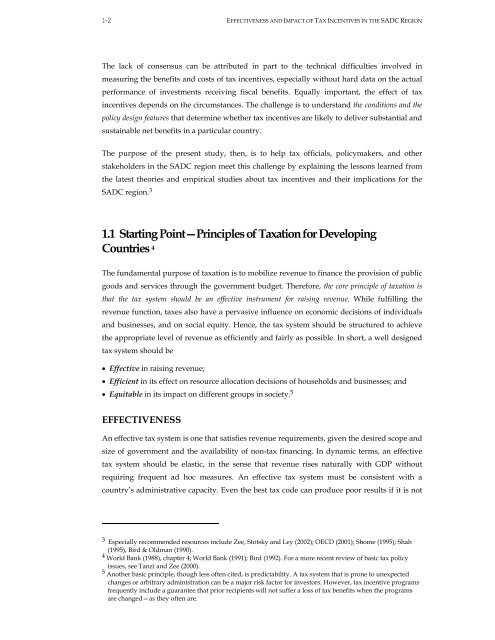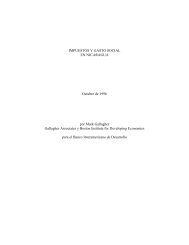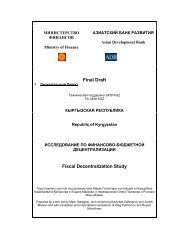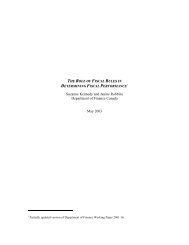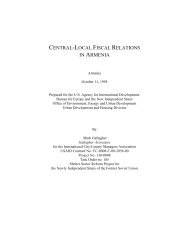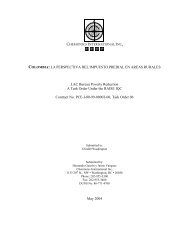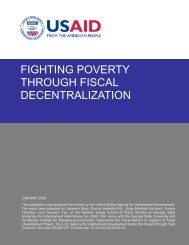Effectiveness and Economic Impact of Tax Incentives in the SADC ...
Effectiveness and Economic Impact of Tax Incentives in the SADC ...
Effectiveness and Economic Impact of Tax Incentives in the SADC ...
You also want an ePaper? Increase the reach of your titles
YUMPU automatically turns print PDFs into web optimized ePapers that Google loves.
1-2 EFFECTIVENESS AND IMPACT OF TAX INCENTIVES IN THE <strong>SADC</strong> REGION<br />
The lack <strong>of</strong> consensus can be attributed <strong>in</strong> part to <strong>the</strong> technical difficulties <strong>in</strong>volved <strong>in</strong><br />
measur<strong>in</strong>g <strong>the</strong> benefits <strong>and</strong> costs <strong>of</strong> tax <strong>in</strong>centives, especially without hard data on <strong>the</strong> actual<br />
performance <strong>of</strong> <strong>in</strong>vestments receiv<strong>in</strong>g fiscal benefits. Equally important, <strong>the</strong> effect <strong>of</strong> tax<br />
<strong>in</strong>centives depends on <strong>the</strong> circumstances. The challenge is to underst<strong>and</strong> <strong>the</strong> conditions <strong>and</strong> <strong>the</strong><br />
policy design features that determ<strong>in</strong>e whe<strong>the</strong>r tax <strong>in</strong>centives are likely to deliver substantial <strong>and</strong><br />
susta<strong>in</strong>able net benefits <strong>in</strong> a particular country.<br />
The purpose <strong>of</strong> <strong>the</strong> present study, <strong>the</strong>n, is to help tax <strong>of</strong>ficials, policymakers, <strong>and</strong> o<strong>the</strong>r<br />
stakeholders <strong>in</strong> <strong>the</strong> <strong>SADC</strong> region meet this challenge by expla<strong>in</strong><strong>in</strong>g <strong>the</strong> lessons learned from<br />
<strong>the</strong> latest <strong>the</strong>ories <strong>and</strong> empirical studies about tax <strong>in</strong>centives <strong>and</strong> <strong>the</strong>ir implications for <strong>the</strong><br />
<strong>SADC</strong> region. 3<br />
1.1 Start<strong>in</strong>g Po<strong>in</strong>t—Pr<strong>in</strong>ciples <strong>of</strong> <strong>Tax</strong>ation for Develop<strong>in</strong>g<br />
Countries 4<br />
The fundamental purpose <strong>of</strong> taxation is to mobilize revenue to f<strong>in</strong>ance <strong>the</strong> provision <strong>of</strong> public<br />
goods <strong>and</strong> services through <strong>the</strong> government budget. Therefore, <strong>the</strong> core pr<strong>in</strong>ciple <strong>of</strong> taxation is<br />
that <strong>the</strong> tax system should be an effective <strong>in</strong>strument for rais<strong>in</strong>g revenue. While fulfill<strong>in</strong>g <strong>the</strong><br />
revenue function, taxes also have a pervasive <strong>in</strong>fluence on economic decisions <strong>of</strong> <strong>in</strong>dividuals<br />
<strong>and</strong> bus<strong>in</strong>esses, <strong>and</strong> on social equity. Hence, <strong>the</strong> tax system should be structured to achieve<br />
<strong>the</strong> appropriate level <strong>of</strong> revenue as efficiently <strong>and</strong> fairly as possible. In short, a well designed<br />
tax system should be<br />
• Effective <strong>in</strong> rais<strong>in</strong>g revenue;<br />
• Efficient <strong>in</strong> its effect on resource allocation decisions <strong>of</strong> households <strong>and</strong> bus<strong>in</strong>esses; <strong>and</strong><br />
• Equitable <strong>in</strong> its impact on different groups <strong>in</strong> society. 5<br />
EFFECTIVENESS<br />
An effective tax system is one that satisfies revenue requirements, given <strong>the</strong> desired scope <strong>and</strong><br />
size <strong>of</strong> government <strong>and</strong> <strong>the</strong> availability <strong>of</strong> non-tax f<strong>in</strong>anc<strong>in</strong>g. In dynamic terms, an effective<br />
tax system should be elastic, <strong>in</strong> <strong>the</strong> sense that revenue rises naturally with GDP without<br />
requir<strong>in</strong>g frequent ad hoc measures. An effective tax system must be consistent with a<br />
country’s adm<strong>in</strong>istrative capacity. Even <strong>the</strong> best tax code can produce poor results if it is not<br />
3 Especially recommended resources <strong>in</strong>clude Zee, Stotsky <strong>and</strong> Ley (2002); OECD (2001); Shome (1995); Shah<br />
(1995), Bird & Oldman (1990).<br />
4 World Bank (1988), chapter 4; World Bank (1991); Bird (1992). For a more recent review <strong>of</strong> basic tax policy<br />
issues, see Tanzi <strong>and</strong> Zee (2000).<br />
5 Ano<strong>the</strong>r basic pr<strong>in</strong>ciple, though less <strong>of</strong>ten cited, is predictability. A tax system that is prone to unexpected<br />
changes or arbitrary adm<strong>in</strong>istration can be a major risk factor for <strong>in</strong>vestors. However, tax <strong>in</strong>centive programs<br />
frequently <strong>in</strong>clude a guarantee that prior recipients will not suffer a loss <strong>of</strong> tax benefits when <strong>the</strong> programs<br />
are changed—as <strong>the</strong>y <strong>of</strong>ten are.


